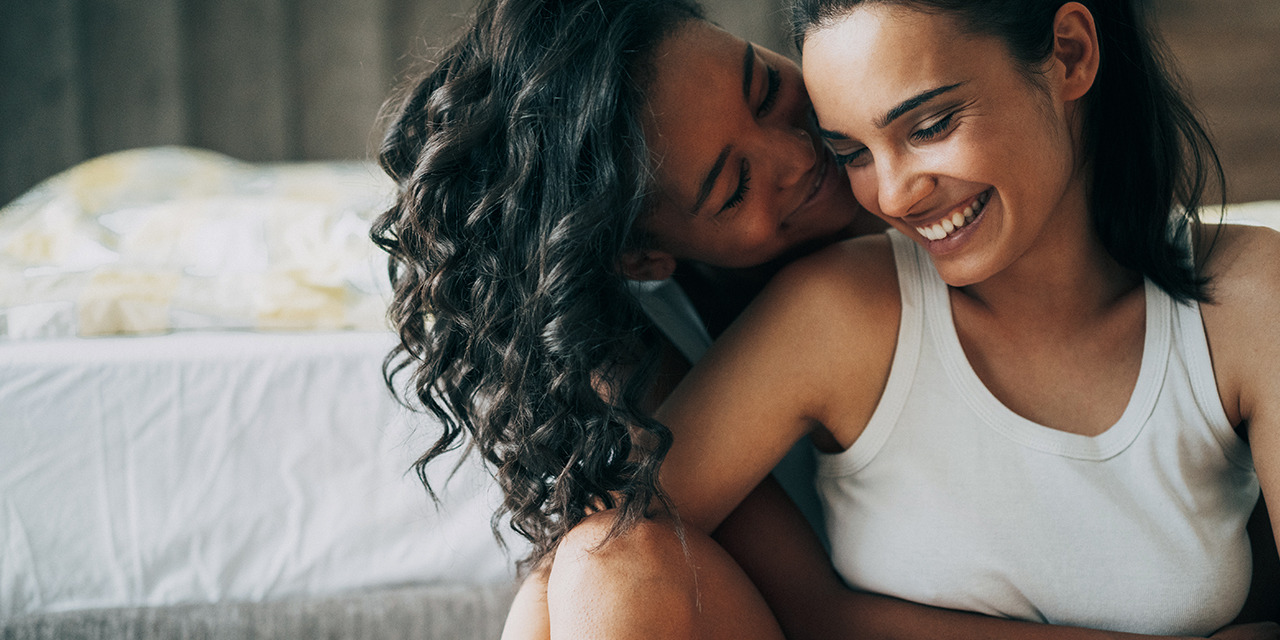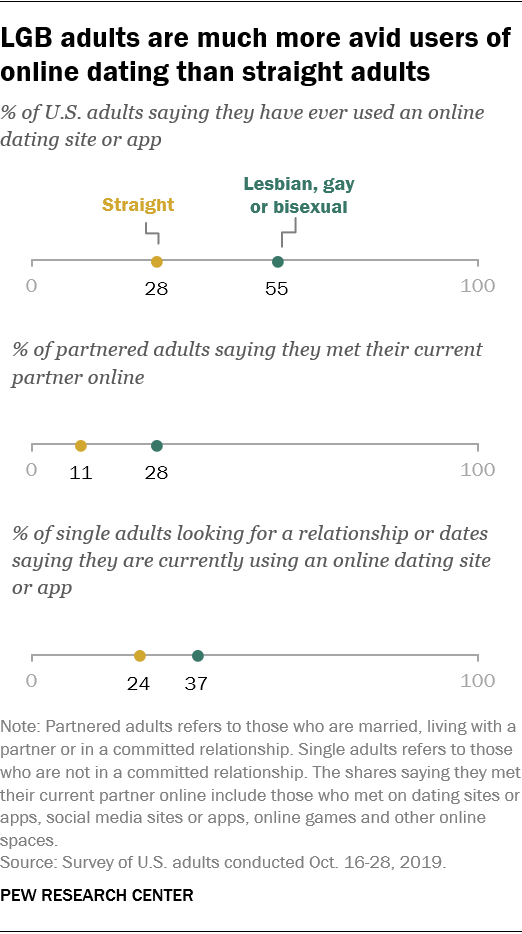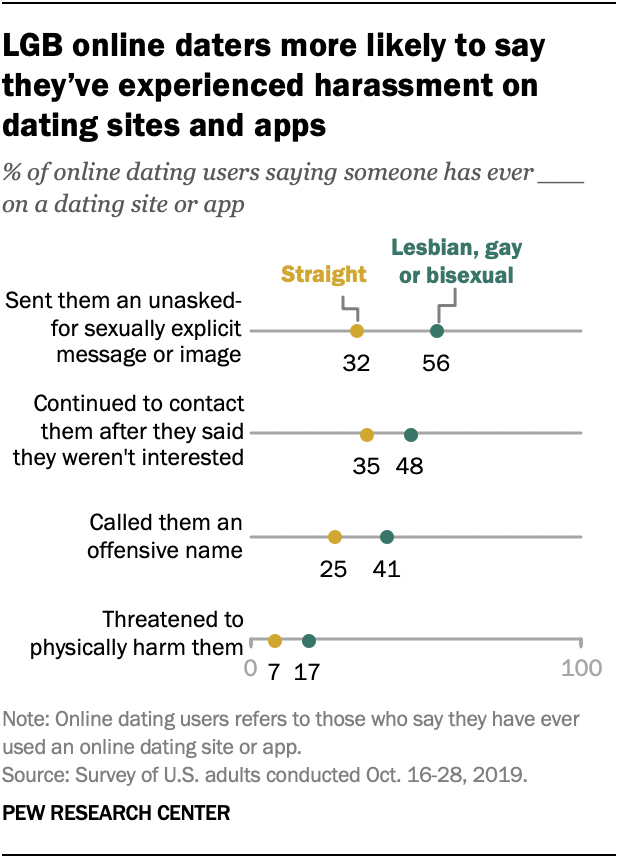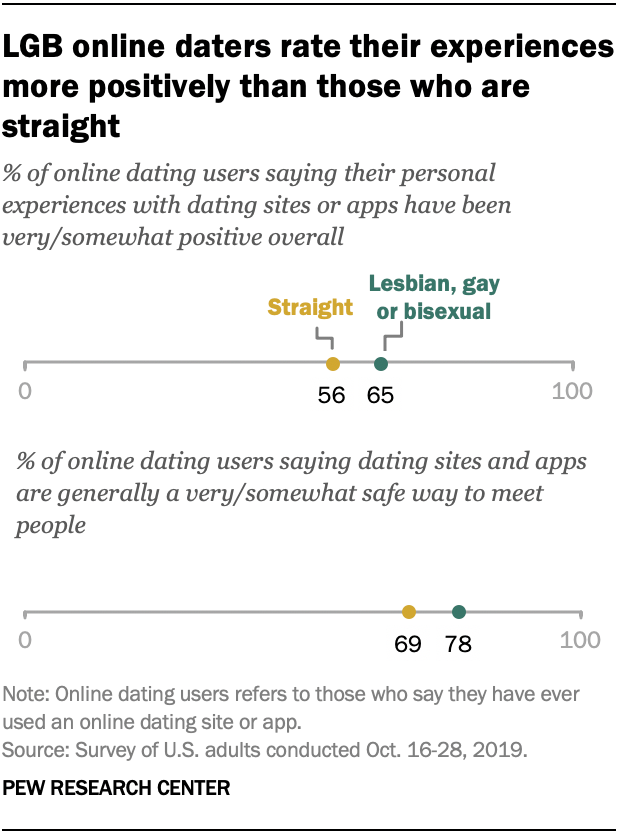
Lesbian, gay and bisexual (LGB) adults in the United States are avid users of online dating sites and apps, according to a recent Pew Research Center survey.  LGB online daters generally report that their experiences with online dating have been positive – even more so than straight online daters. At the same time, they are more likely than their straight counterparts to experience a range of negative behaviors on dating platforms – from name-calling to physical threats.
LGB online daters generally report that their experiences with online dating have been positive – even more so than straight online daters. At the same time, they are more likely than their straight counterparts to experience a range of negative behaviors on dating platforms – from name-calling to physical threats.
One of the advantages of online dating is that it can help people with a small pool of potential partners – such as those seeking same-sex partners – to find a match. To that end, the survey finds that a majority of LGB adults (55%) report that they have used an online dating site or app at some point, roughly twice the share of straight adults (28%) who say the same. Among LGB adults who are married, living with a partner, or in a committed relationship, 28% say they met their current partner online, compared with 11% of partnered straight adults. And among LGB people who are now single and looking for a relationship or dates, 37% are currently online dating (vs. 24% of straight people who are single and looking).
This analysis focuses on the unique online dating experiences of lesbian, gay and bisexual (LGB) adults in the U.S. and how they compare with the experiences of straight adults. These findings are based on a survey conducted Oct. 16 to 28, 2019, among 4,860 U.S. adults. This includes those who took part as members of Pew Research Center’s American Trends Panel (ATP), an online survey panel that is recruited through national, random sampling of residential addresses. The analysis also used an oversample of respondents who indicated that they identify as lesbian, gay or bisexual from Ipsos’s KnowledgePanel, an online survey panel that is recruited through national, random sampling. The margin of sampling error for those who identify as LGB and have ever used an online dating site or app is plus or minus 5.7 percentage points and for those who identify as straight and have ever used an online dating site or app is plus or minus 4.2 percentage points.
Recruiting ATP panelists by phone or mail ensures that nearly all U.S. adults have a chance of selection. This gives us confidence that any sample can represent the whole U.S. adult population (see our Methods 101 explainer on random sampling). To further ensure that each ATP survey reflects a balanced cross-section of the nation, the data are weighted to match the U.S. adult population by gender, race, ethnicity, partisan affiliation, education and other categories.
Due to small sample sizes, we were not able to analyze lesbians, gay men or bisexual adults as separate groups or analyze other demographic subgroups among those who are LGB. Since this research was focused on sexual orientation, not gender identity, and due to the fact that the transgender population in the U.S. is very small, transgender respondents are not identified separately.
Here are the questions asked for this report, along with responses, and its methodology.
Harassment on dating sites and apps is fairly common among LGB online daters
 Relatively large shares of lesbian, gay or bisexual online daters – that is, those who have ever used an online dating site or app – report that they have experienced at least one of the forms of harassment measured in this survey on those sites and apps (69%, compared with 52% of their straight counterparts):
Relatively large shares of lesbian, gay or bisexual online daters – that is, those who have ever used an online dating site or app – report that they have experienced at least one of the forms of harassment measured in this survey on those sites and apps (69%, compared with 52% of their straight counterparts):
- More than half of LGB online daters (56%) say they have received a sexually explicit message or image they did not ask for, compared with 32% of straight online daters who say the same.
- Roughly half of LGB online daters (48%) say that someone has continued to contact them after they said they weren’t interested, compared with 35% of their straight counterparts.
- About four-in-ten LGB online daters (41%) say someone has called them an offensive name on one of these sites or apps – 16 percentage points higher than the share of straight online daters (25%) who say the same. And while a smaller share of LGB online daters (17%) say that someone on a dating site or app has threatened to physically harm them, this is roughly twice the share of straight online daters who say this has happened to them (7%).
- LGB adults who have ever online dated are also more likely than straight online daters to think harassment and bullying is a common problem on dating sites and apps, but majorities of both groups say this is the case (70% vs. 61%).
- Those who have personally experienced at least one of these harassing behaviors on dating sites and apps are particularly likely to say harassment is a common problem. This is true among both LGB and straight adults who have used online dating.
- LGB online daters almost universally think it’s common for people to receive sexually explicit messages or images they did not ask for (90% say it’s at least somewhat common). A slightly lower, but still high, share of straight online daters say the same (80%). This view is common even among online daters who report that they have never received an unasked-for explicit image or message themselves: 82% of LGB and 73% of straight online daters who have not experienced this themselves say it’s very or somewhat common on dating sites and apps.
It’s important to note that while we refer to these behaviors as “harassment,” the survey questions themselves did not use this word. A 2017 survey of U.S. adults found that many people who had experienced a number of harassing behaviors online, even severe ones such as physical threats, did not think of their experiences as “online harassment,” and only a minority said that they stopped using an online platform because of it.
Most LGB online daters say their online dating experience was positive and think these sites and apps are safe
About two-thirds (65%) of people who identify as lesbian, gay or bisexual and have used online dating sites or apps say their experience was very or somewhat positive. By contrast, 56% of straight online daters say their personal experiences were positive overall.
 Most LGB users rank their experiences positively, even those who have experienced any form of harassment on these sites (61%), including receiving unsolicited explicit images or messages or someone continuing to contact them after they said they weren’t interested.
Most LGB users rank their experiences positively, even those who have experienced any form of harassment on these sites (61%), including receiving unsolicited explicit images or messages or someone continuing to contact them after they said they weren’t interested.
A large majority of LGB online daters (78%) feel that dating sites and apps are a very or somewhat safe way to meet people, somewhat higher than the share of straight online daters who say the same (69%).
Strikingly, even among LGB and straight online daters who have experienced at least one of the asked-about forms of harassment on dating sites and apps, high shares say that online dating is safe for the most part. Three-quarters of LGB people who have experienced at least one of the harassing behaviors on dating sites or apps say it’s a very or somewhat safe way to meet someone, and 64% of straight online daters who have been harassed agree.
Note: Here are the questions asked for this report, along with responses, and its methodology.



